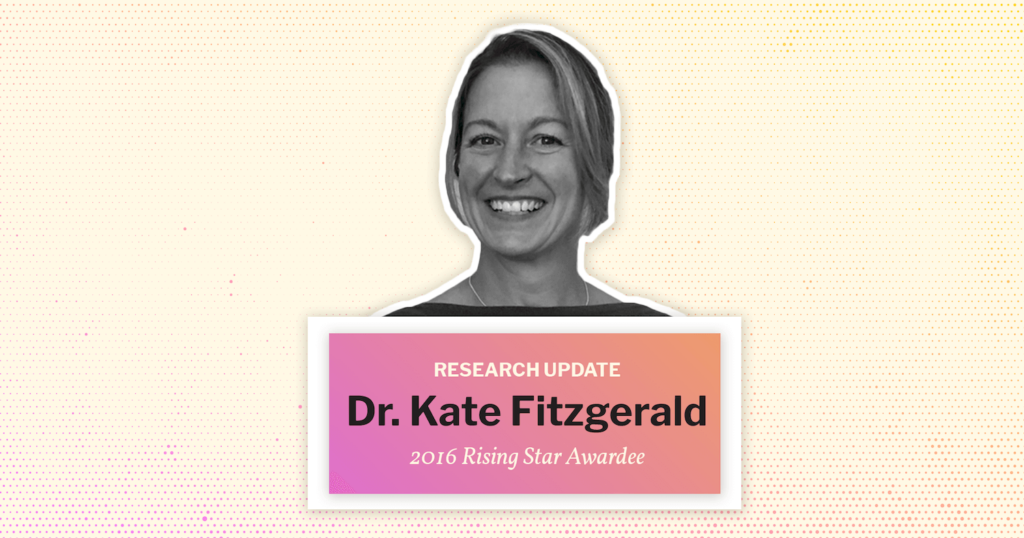Dr. Kate Fitzgerald – Reducing anxiety in preschool-aged children

Rising Star Award Research Update – Kate Fitzgerald,
Associate Professor of Psychiatry at the University of Michigan
2016 One Mind/Aim Sullivan Family Foundation Rising Star Award winner
Childhood and adolescence is the core risk phase for the development of anxiety symptoms and syndromes. The fear of new experiences is common for young children, but for the 20% who suffer from clinically significant anxiety, this fear can spiral into long-lasting negative effects. Current anxiety treatments do not work for all, with 30-50% of those who do receive treatment still having anxiety post treatment. When left unchecked, this clinically significant anxiety can persist into adulthood and can lead to depression, substance abuse, unemployment and even suicide.
Dr. Kate Fitzgerald, Associate Professor of Psychiatry at the University of Michigan, won the 2016 One Mind/Aim Sullivan Family Foundation Rising Star Award for her proposal to test the neurobiological and behavioral effects of an original psychosocial treatment aimed to strengthen effortful control (EC), a cognitive skill that she hypothesizes, if increased, could help remedy clinical anxiety in young children. Children who suffer from anxiety disorders typically display lower levels of effortful control than their non-anxious counterparts, making them less likely to directly confront fearful situations. They also exhibit a smaller error-related negativity (ERN) – a measure of brain response to errors believed to underlie effortful control. In children, a lower ERN may combine with a larger fear-potentiated startle (FPS) to increase anxiety.
Since 2017, Dr. Fitzgerald has tested her hypothesis via ‘Camp Kid Power’ a series of interactive camps for preschoolers. Including the three camps they hosted in 2019, Dr. Fitzgerald and her team have held a total of 9 camps, enrolling a total of 45 kids total with the mean age of 5.49 years. Each camp included 4-6 children that have clinically significant anxiety, and their parents, who attended 4-5 camp sessions over a number of consecutive weeks. The camps consist of several short game-like exercises that teach effortful control skills, including selective attention, response inhibition, and set shifting. Previous research by Dr. Fitzgerald and her UM collaborators, Drs. Kate Rosenblum and Maria Muzik, assessed the relationship between the ERN, FPS and a spectrum of anxiety severity in children as a foundational step.
At each camp, each child’s anxiety was measured before and after the camps using the Preschool Anxiety Scale (PAS). Combining their three years of data, the children’s mean PAS T-score decreased from 62.69 at study entry to 58.44 at study end. In addition, the effortful control behaviors for each participating child increased from pre- to post intervention as measured on the Dimensional Change Card Sort and Flanker tasks, as did their ERN. These findings are encouraging and consistent with her study aims; that the EC training provided within the camps helps increase ERN and decrease FPS, that the EC training increases effortful control behaviors, and that it may help to decrease anxiety. Motivated by the positive results of this study, Dr. Fitzgerald and her team are now pursuing a grant from the National Institute of Mental Health to expand the scale of this work.
At a time when the current treatments for anxiety continue to fall short and the number of children who are taking prescription drugs is skyrocketing, it is exciting to see the progress Dr. Fitzgerald has made in this novel, non-drug treatment option for anxiety. We are honored to support Dr. Fitzgerald via the One Mind Rising Star Award program and are grateful to the donors of AIM for Mental Health who have enabled us to do so.
Dr. Fitzgerald and her work were highlighted in this Science News article in April 2019.
